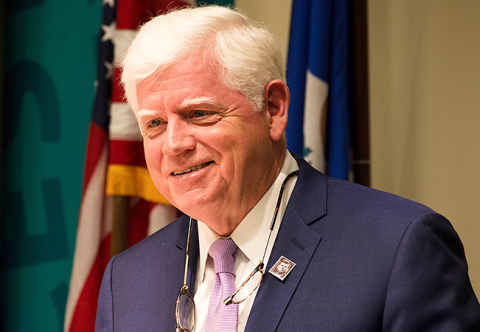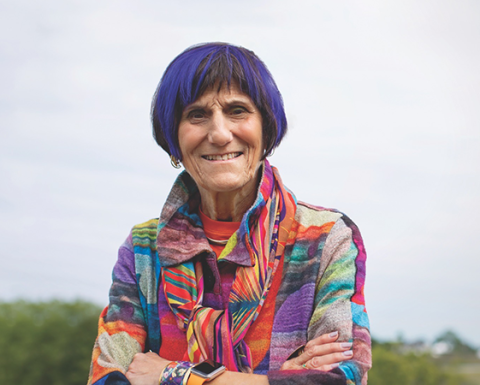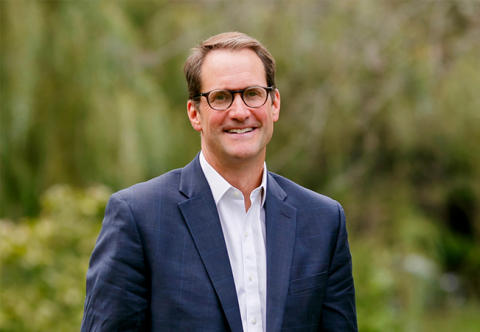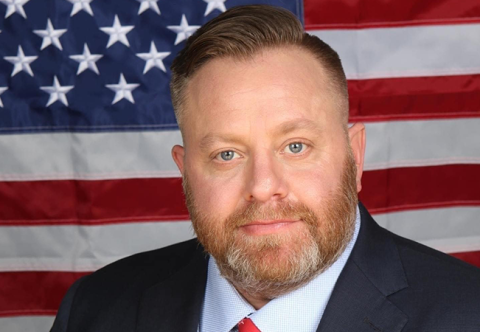Connecticut Children's sent a four-question survey to congressional candidates on this year's ballot in Connecticut. Below are the responses we received.
1st Congressional District
John Larson (D)

East Hartford born and raised. Product of public housing, public schools, and public service. Former high school teacher, athletic coach, small business owner, Board of Education member, Town Councilor, State Senator, and am now proud to represent the 1st Congressional District. My wife Leslie and I have three beautiful children.
In May 2024, in observance of National Mental Health Awareness Month, Children’s Hospital Association CEO Matthew Cook released a statement highlighting that organization’s longstanding prioritization of the youth mental health crisis. He said: “Now is the time for a concerted effort from all sectors of society—health care providers, educators, parents, and policymakers—to rally behind this cause. By addressing the systemic issues that contribute to the current state of children's mental health, we can create a future where mental health support is accessible and prioritized in the same way as physical health care.” What steps would you take as a federal legislator to improve child and adolescent access to mental health prevention and treatment services?
We must ensure there are enough pediatric care providers, and ensure that every child has access to quality care. I have fought for and will continue to fight for programs like CHIP and Medicaid, and to develop a stronger pediatric workforce in Connecticut. Congress must work with local providers to educate parents, teachers, and communities on recognizing children in need before they are in crisis. Affordability is a significant component of accessibility, and I was proud to help write and pass legislation that extends the Affordable Care Act exchange credits to significantly lower healthcare costs for Connecticut families.
Across the country, most academic medical centers receive Graduate Medical Education payments from Medicare to support their programs that train tomorrow’s physicians. Since independent children’s hospitals like Connecticut Children’s do not receive any funding from Medicare, Congress created the Children’s Hospitals Graduate Medical Education (CHGME) Payment Program. CHGME supports the nation’s 59 children’s hospitals, which together train approximately half of the nation’s pediatricians. What changes, if any, should Congress make to the CHGME program to ensure that children across the country have access to the quality health care they need?
I am a strong supporter of the Children’s Hospital Graduate Medical Center Education program that is critical to training the next generation of pediatric physicians and ensuring a strong pediatric physician workforce at places like Connecticut Children’s Medical Center. I was proud to cosponsor the CHGME Support Reauthorization Act that was signed into law in 2018 and reauthorized this critical program. Congress must pass a clean, bipartisan reauthorization of the CHGME program without culture war poison pills as the Republican House has unfortunately prioritized this Congress.
At Connecticut Children’s, you will often hear our team members say that, “kids are not little adults.” Their growing bodies and developing minds come with a unique set of healthcare needs. As a result, a robust pediatric workforce is essential to ensuring that all children have access to experts who are specifically trained to care for them. Earlier this year, Connecticut Children’s Chief Nursing Officer Sarah Matney told the state legislature’s Public Health Committee: “As is the case for other hospitals and healthcare providers across the state, we are facing significant workforce shortages and struggle to find qualified staff for many positions in our health system—from medical assistants to child psychologists to nurses. According to the Governor’s Workforce Council, Connecticut will need to hire 3,000 new nurses every year and we know that there are only about 1,900 new nursing school graduates per year.” What steps would you take as a member of Congress to strengthen Connecticut’s healthcare workforce to promote the access to care that children and families deserve?
Addressing Connecticut’s healthcare workforce requires a holistic focus on all levels of training. Sustained investments can not only support patients, but also provide opportunities to individuals. As a member of the Ways and Means Committee, I have worked to strengthen the Health Profession Opportunity Grants (HPOG) program which helps low-income individuals access occupational training for low-, mid-, and high- level healthcare positions, and also wrap around services like transportation and childcare. In addition to investing in workforce training, we must keep the caregivers we have by addressing the medical worker burnout epidemic.
Connecticut Children’s recognizes that only about 10% of children’s overall health and wellbeing is determined by the access to and quality of the health care services they receive. Connecticut Children’s Office for Community Child Health works to improve the wide variety of factors that influence a child’s health (often referred to as “the social influencers of health”) such as housing, transportation, food and nutrition, and family support services. All too often, we see families who lack reliable transportation to travel to medical appointments, struggle to afford healthy meals, or cannot afford all of their utility bills. How can Congress help ensure that kids across Connecticut have equal opportunities to grow and learn, regardless of where they live?
We need to look at quality and affordable housing, uplifting underserved communities, making everyone’s air and water safe, ending gun violence, and closing our education achievement gap. We should also support children directly. As part of the American Rescue Plan, I helped pass the expanded Child Tax Credit, which cut childhood poverty in half. That credit should be made permanent. Additionally, over 35,000 children in Connecticut are direct beneficiaries of Social Security and many others are being raised by family who rely on Social Security. My bill, Social Security 2100, will enhance benefits while ensuring the program stays solvent.
2nd Congressional District
Joe Courtney (D)

Joe Courtney has served as an independent voice and tireless advocate for eastern Connecticut for 25 years. First elected to Congress in 2006, Joe fights each day to protect jobs in the region and expand opportunities for Connecticut businesses. Joe lives in Vernon with his wife Audrey, a pediatric nurse practitioner who has dedicated her career to caring for victims of child abuse. An avid golfer, Joe enjoys rooting for UConn and Boston sports.
In May 2024, in observance of National Mental Health Awareness Month, Children’s Hospital Association CEO Matthew Cook released a statement highlighting that organization’s longstanding prioritization of the youth mental health crisis. He said: “Now is the time for a concerted effort from all sectors of society—health care providers, educators, parents, and policymakers—to rally behind this cause. By addressing the systemic issues that contribute to the current state of children's mental health, we can create a future where mental health support is accessible and prioritized in the same way as physical health care.” What steps would you take as a federal legislator to improve child and adolescent access to mental health prevention and treatment services?
Ensuring children have the mental health support they need starts in part at schools, where I have supported federal funding to increase the number of mental health professionals supporting students. I also support improved Mental Health Parity rules, to ensure that when parents seek clinical care for their children, they are not blocked by restrictive insurance requirements. Lastly, we need to increase the number of MH professionals, especially those who specialize in treating children. We should do this by strengthening the CHGME and loan repayment programs that support providers seeking the extra education needed to become a pediatric specialist.
Across the country, most academic medical centers receive Graduate Medical Education payments from Medicare to support their programs that train tomorrow’s physicians. Since independent children’s hospitals like Connecticut Children’s do not receive any funding from Medicare, Congress created the Children’s Hospitals Graduate Medical Education (CHGME) Payment Program. CHGME supports the nation’s 59 children’s hospitals, which together train approximately half of the nation’s pediatricians. What changes, if any, should Congress make to the CHGME program to ensure that children across the country have access to the quality health care they need?
The CHGME program is the only graduate medical education program specifically for pediatric doctors and specialists, and it trains more than half of the country’s general pediatric residents and more than half of the pediatric subspecialists. The best way to improve the CHGME program is to support increased appropriations through the annual appropriations process. That’s why year over year I have advocated for increased funding for the CHGME program, so that we can ensure that hospitals like Connecticut Childrens’ remain staffed by the expertly trained physicians that have made our state a leader in pediatric healthcare.
At Connecticut Children’s, you will often hear our team members say that, “kids are not little adults.” Their growing bodies and developing minds come with a unique set of healthcare needs. As a result, a robust pediatric workforce is essential to ensuring that all children have access to experts who are specifically trained to care for them. Earlier this year, Connecticut Children’s Chief Nursing Officer Sarah Matney told the state legislature’s Public Health Committee: “As is the case for other hospitals and healthcare providers across the state, we are facing significant workforce shortages and struggle to find qualified staff for many positions in our health system—from medical assistants to child psychologists to nurses. According to the Governor’s Workforce Council, Connecticut will need to hire 3,000 new nurses every year and we know that there are only about 1,900 new nursing school graduates per year.” What steps would you take as a member of Congress to strengthen Connecticut’s healthcare workforce to promote the access to care that children and families deserve?
Increasing the number of nurses and other health care professionals working in Connecticut is a crucial workforce goal. As a senior member of the Education and the Workforce Committee, I have worked to strengthen our nation’s workforce development law, the Workforce Innovation and Opportunity Act, to better connect students, schools, and employers to address specific local workforce needs. In CT, federal funds have been used to expand training programs for healthcare workers, like through the Eastern Connecticut Healthcare Pipeline. Starting more students in jobs like nursing assistant roles provides a foundation for future career growth into roles like nursing.
Connecticut Children’s recognizes that only about 10% of children’s overall health and wellbeing is determined by the access to and quality of the health care services they receive. Connecticut Children’s Office for Community Child Health works to improve the wide variety of factors that influence a child’s health (often referred to as “the social influencers of health”) such as housing, transportation, food and nutrition, and family support services. All too often, we see families who lack reliable transportation to travel to medical appointments, struggle to afford healthy meals, or cannot afford all of their utility bills. How can Congress help ensure that kids across Connecticut have equal opportunities to grow and learn, regardless of where they live?
Children’s health starts in their communities, and in large part, at their schools. I support programs that ensure children are safe and healthy at school, including by providing free and nutritious lunches, ensuring sufficient mental and emotional support staff, and full funding for IDEA, which supports students with disabilities. At home, I support programs like LIHEAP which helps low income families cover home energy costs, and programs that help families pay for internet. In the community, I support improvements to public transit like the billions invested through the Bipartisan Infrastructure Law, helping overcome the tyranny of distance in eastern CT.
3rd Congressional District

Rosa DeLauro (D)
My work has been and will always be about helping people. I fight hard to be a forthright advocate for the constituents of CT-03, and a leader on matters of domestic and social policy. Families are struggling and are living paycheck-to-paycheck. That’s why I continue to fight for raising wages, paid sick and paid leave for all, good-paying jobs, strengthening our social safety net and implementing a permanent Child Tax Credit.
In May 2024, in observance of National Mental Health Awareness Month, Children’s Hospital Association CEO Matthew Cook released a statement highlighting that organization’s longstanding prioritization of the youth mental health crisis. He said: “Now is the time for a concerted effort from all sectors of society—health care providers, educators, parents, and policymakers—to rally behind this cause. By addressing the systemic issues that contribute to the current state of children's mental health, we can create a future where mental health support is accessible and prioritized in the same way as physical health care.” What steps would you take as a federal legislator to improve child and adolescent access to mental health prevention and treatment services?
As the top Democrat on the Labor-Health and Human Services Appropriations Subcommittee, while in the minority, I have protected funding for the Children’s Mental Health, the Pediatric Mental Health Access, and Infant and Early Childhood Mental Health program (SAMHSA) and School-based Health centers (HRSA). I am committed to growing these investments after several years of the Republicans’ failure to do so in these programs as well as the workforce to ensure we have providers to help children and adolescents. There needs to be a serious conversation about increasing reimbursement rates for providers, and reducing bureaucratic hurdles like prior authorization.
Across the country, most academic medical centers receive Graduate Medical Education payments from Medicare to support their programs that train tomorrow’s physicians. Since independent children’s hospitals like Connecticut Children’s do not receive any funding from Medicare, Congress created the Children’s Hospitals Graduate Medical Education (CHGME) Payment Program. CHGME supports the nation’s 59 children’s hospitals, which together train approximately half of the nation’s pediatricians. What changes, if any, should Congress make to the CHGME program to ensure that children across the country have access to the quality health care they need?
As the top Democrat on the Labor-Health and Human Services Appropriations Subcommittee, I have ensured we continue to increase funding for CHGME, but I know we need to make further investments. In a challenging budget climate under the House Republicans, I have been able to ensure there was a modest increase when many programs did not receive one. You have my commitment that I will continue to support sustained investments in CHGME to ensure we can help independent children’s hospitals be able to train the next generation of pediatricians.
At Connecticut Children’s, you will often hear our team members say that, “kids are not little adults.” Their growing bodies and developing minds come with a unique set of healthcare needs. As a result, a robust pediatric workforce is essential to ensuring that all children have access to experts who are specifically trained to care for them. Earlier this year, Connecticut Children’s Chief Nursing Officer Sarah Matney told the state legislature’s Public Health Committee: “As is the case for other hospitals and healthcare providers across the state, we are facing significant workforce shortages and struggle to find qualified staff for many positions in our health system—from medical assistants to child psychologists to nurses. According to the Governor’s Workforce Council, Connecticut will need to hire 3,000 new nurses every year and we know that there are only about 1,900 new nursing school graduates per year.” What steps would you take as a member of Congress to strengthen Connecticut’s healthcare workforce to promote the access to care that children and families deserve?
When I served as Chair of the Labor-HHS Appropriations Subcommittee, I ensured Congress made critical, annual investments of more than $1 billion in HRSA’s health workforce development programs in primary care, oral health, pediatric subspecialties, behavioral health, nursing through, and in support for SAMHSA’s programs focusing on the provision of mental health services from infancy through adolescence. When the House Republicans, who eliminated or drastically cut workforce programs from their bills, I was able to ensure these programs were not eliminated and their funding restored, but it is imperative we provide more funding to expand this critical workforce.
Connecticut Children’s recognizes that only about 10% of children’s overall health and wellbeing is determined by the access to and quality of the health care services they receive. Connecticut Children’s Office for Community Child Health works to improve the wide variety of factors that influence a child’s health (often referred to as “the social influencers of health”) such as housing, transportation, food and nutrition, and family support services. All too often, we see families who lack reliable transportation to travel to medical appointments, struggle to afford healthy meals, or cannot afford all of their utility bills. How can Congress help ensure that kids across Connecticut have equal opportunities to grow and learn, regardless of where they live?
In 2021, I helped secure the expanded Child Tax Credit (CTC) in the American Rescue Plan, based on my American Family Act (AFA), that significantly contributed to the child poverty rate falling nearly in half. This meant for the 361,000 families of 583,000 children in Connecticut, the monthly checks gave stability to those experiencing poverty and to middle class families, as they tackled the expenses of everyday life. The AFA provides a baby bonus to help families in that critical, yet, expensive first year of life. I will not stop fighting until the expanded, monthly CTC is permanent.
4th Congressional District
Jim Himes (D)

Since his election in 2008, Jim Himes has delivered for Connecticut, focusing on infrastructure, economic growth, and healthcare access. Born in Peru, Jim attended Harvard and earned a Rhodes Scholarship. After 12 years in the private sector, he led the NYC branch of an affordable housing nonprofit. He serves as the Top Democrat on the House Intelligence Committee. Jim and his wife Mary have lived in Cos Cob for nearly 30 years.
In May 2024, in observance of National Mental Health Awareness Month, Children’s Hospital Association CEO Matthew Cook released a statement highlighting that organization’s longstanding prioritization of the youth mental health crisis. He said: “Now is the time for a concerted effort from all sectors of society—health care providers, educators, parents, and policymakers—to rally behind this cause. By addressing the systemic issues that contribute to the current state of children's mental health, we can create a future where mental health support is accessible and prioritized in the same way as physical health care.” What steps would you take as a federal legislator to improve child and adolescent access to mental health prevention and treatment services?
The youth mental health crisis is a pressing issue, especially as we recover from COVID-19. As a member of Congress, I will focus on expanding access to mental health services for children by ensuring schools, community centers, and healthcare providers have the resources to employ trained professionals. This includes increased federal funding for school-based programs and incentivizing early intervention services. I will support legislation strengthening partnerships between healthcare providers and community organizations, as well as expanding telehealth options for underserved areas. Collaboration between federal agencies is essential to prioritize mental health as a core part of overall well-being.
Across the country, most academic medical centers receive Graduate Medical Education payments from Medicare to support their programs that train tomorrow’s physicians. Since independent children’s hospitals like Connecticut Children’s do not receive any funding from Medicare, Congress created the Children’s Hospitals Graduate Medical Education (CHGME) Payment Program. CHGME supports the nation’s 59 children’s hospitals, which together train approximately half of the nation’s pediatricians. What changes, if any, should Congress make to the CHGME program to ensure that children across the country have access to the quality health care they need?
Congress must prioritize the Children's Hospitals Graduate Medical Education (CHGME) Payment Program to ensure a robust pediatric workforce. I will advocate for expanding CHGME funding to allow independent children’s hospitals, like Connecticut Children’s, to train pediatricians, specialists, and mental health professionals. Funding for CHGME has remained stagnant – it is critical that funding meets demand and inflation. Additionally, securing a stable funding stream that doesn’t rely solely on annual appropriations will help children’s hospitals plan and expand their programs. Strengthening the pediatric workforce ensures all children, regardless of location or income, receive the high-quality healthcare they need.
At Connecticut Children’s, you will often hear our team members say that, “kids are not little adults.” Their growing bodies and developing minds come with a unique set of healthcare needs. As a result, a robust pediatric workforce is essential to ensuring that all children have access to experts who are specifically trained to care for them. Earlier this year, Connecticut Children’s Chief Nursing Officer Sarah Matney told the state legislature’s Public Health Committee: “As is the case for other hospitals and healthcare providers across the state, we are facing significant workforce shortages and struggle to find qualified staff for many positions in our health system—from medical assistants to child psychologists to nurses. According to the Governor’s Workforce Council, Connecticut will need to hire 3,000 new nurses every year and we know that there are only about 1,900 new nursing school graduates per year.” What steps would you take as a member of Congress to strengthen Connecticut’s healthcare workforce to promote the access to care that children and families deserve?
Healthcare workforce shortages, particularly in pediatric care, are low with vacancies of 40 – 54% in six areas, including adolescent medicine, child adolescent psychiatry, and developmental-behavioral pediatrics. I support investing in workforce development, increasing federal healthcare education funding, and incentivizing young people to enter and stay in the field. We must expand funding for nursing and medical assistant programs, including apprenticeship models and accelerated pathways. Increasing nursing school capacity, with infrastructure investments and faculty recruitment, is essential. Loan forgiveness and scholarships for those serving in high-need areas like pediatrics will also help, as will addressing affordable housing for healthcare workers.
Connecticut Children’s recognizes that only about 10% of children’s overall health and wellbeing is determined by the access to and quality of the health care services they receive. Connecticut Children’s Office for Community Child Health works to improve the wide variety of factors that influence a child’s health (often referred to as “the social influencers of health”) such as housing, transportation, food and nutrition, and family support services. All too often, we see families who lack reliable transportation to travel to medical appointments, struggle to afford healthy meals, or cannot afford all of their utility bills. How can Congress help ensure that kids across Connecticut have equal opportunities to grow and learn, regardless of where they live?
To ensure all children in Connecticut thrive, Congress must address the social factors impacting health, such as housing, transportation, and food access. I support expanding funding for affordable housing, public transportation, and nutrition assistance programs like SNAP and WIC. Ensuring families have reliable access to healthcare, nutritious meals, and safe homes is critical to leveling the playing field. Additionally, expanding family support services and early childhood education programs will give children the foundation to grow, learn, and achieve their full potential, regardless of their background or community.
5th Congressional District
Jahana Hayes (D)

Jahana Hayes is the Congresswoman for the Fifth District of Connecticut. Hayes was elected in November 2018. She is the first African-American Congresswoman from Connecticut. A high school teacher, Hayes first garnered widespread attention when she was named 2016 National Teacher of the Year by President Barack Obama. In her capacity as National Teacher of the Year, Hayes traveled the country and the world engaging public education stakeholders in policy discussions.
In May 2024, in observance of National Mental Health Awareness Month, Children’s Hospital Association CEO Matthew Cook released a statement highlighting that organization’s longstanding prioritization of the youth mental health crisis. He said: “Now is the time for a concerted effort from all sectors of society—health care providers, educators, parents, and policymakers—to rally behind this cause. By addressing the systemic issues that contribute to the current state of children's mental health, we can create a future where mental health support is accessible and prioritized in the same way as physical health care.” What steps would you take as a federal legislator to improve child and adolescent access to mental health prevention and treatment services?
As Congresswoman, I have made providing children the services they need a top priority. I introduced the Expanding Access to Mental Health Services in Schools Act to address the urgent need for mental health professionals in schools. The funding provided by this legislation would increase the number of mental health professionals in schools who both address crisis and offer preventive care. Children deserve easy access to child-centered and trauma-informed mental health services. Having qualified health professionals readily available for students improves academic outcomes and plays a key role in healthy development.
Across the country, most academic medical centers receive Graduate Medical Education payments from Medicare to support their programs that train tomorrow’s physicians. Since independent children’s hospitals like Connecticut Children’s do not receive any funding from Medicare, Congress created the Children’s Hospitals Graduate Medical Education (CHGME) Payment Program. CHGME supports the nation’s 59 children’s hospitals, which together train approximately half of the nation’s pediatricians. What changes, if any, should Congress make to the CHGME program to ensure that children across the country have access to the quality health care they need?
Congress must prioritize getting more children access to high quality, affordable healthcare. One way to do this is to increase funding for and expand the Children’s Hospitals Graduate Medical Education (CHGME) Program, and training more pediatricians to take care of our children. CGHME is the only federal program devoted to training pediatricians and pediatric specialists and I am committed to working to improve this vitally important program. For Fiscal Year 2025, I have asked the Appropriations Committee to provide CHGME with strong funding to "support gains made under the program over the last decade and strengthen the pediatric workforce.
At Connecticut Children’s, you will often hear our team members say that, “kids are not little adults.” Their growing bodies and developing minds come with a unique set of healthcare needs. As a result, a robust pediatric workforce is essential to ensuring that all children have access to experts who are specifically trained to care for them. Earlier this year, Connecticut Children’s Chief Nursing Officer Sarah Matney told the state legislature’s Public Health Committee: “As is the case for other hospitals and healthcare providers across the state, we are facing significant workforce shortages and struggle to find qualified staff for many positions in our health system—from medical assistants to child psychologists to nurses. According to the Governor’s Workforce Council, Connecticut will need to hire 3,000 new nurses every year and we know that there are only about 1,900 new nursing school graduates per year.” What steps would you take as a member of Congress to strengthen Connecticut’s healthcare workforce to promote the access to care that children and families deserve?
While not unique to the healthcare sector, an insufficient workforce pipeline can feel most acute when it comes to doctors, nurses and other medical professionals. It is imperative we adequately fund the programs training these future healthcare workers and put students in a position to find work once they have completed their necessary coursework and trainings. As the Vice Ranking Member of the House Committee on Education and the Workforce and a member of the Subcommittee on Health, Employment, Labor, and Pensions, I have prioritized legislation to fund and expand workforce development programs and ease the high costs of tuition.
Connecticut Children’s recognizes that only about 10% of children’s overall health and wellbeing is determined by the access to and quality of the health care services they receive. Connecticut Children’s Office for Community Child Health works to improve the wide variety of factors that influence a child’s health (often referred to as “the social influencers of health”) such as housing, transportation, food and nutrition, and family support services. All too often, we see families who lack reliable transportation to travel to medical appointments, struggle to afford healthy meals, or cannot afford all of their utility bills. How can Congress help ensure that kids across Connecticut have equal opportunities to grow and learn, regardless of where they live?
As a classroom teacher for 15 years and a mother of four, I know firsthand the impact social determinants have on a child’s health. Hungry children do not learn, and I could always tell when a student had not eaten before coming to school. As the Ranking Member of the House Agriculture Committee Subcommittee on Nutrition, I have championed legislation to feed children and have introduced many bills to address this problem. This includes expanding and improving school meals, while also creating more access to healthy foods during the summer months.
U.S. Senate
Robert Finley Hyde (R)

Robert Finley Hyde is a U.S. Marine Corps Iraqi war veteran and candidate for U.S. Senate. He holds degrees in Finance, Management Information Systems, Geographic Information Science, and Political Science, and is currently earning an MBA and MPA. He has experience working on national political campaigns and local issues. Hyde is committed to revitalizing the economy and promoting energy independence. He resides in Simsbury with his family and black German Shepherds, Thunder and Simba.
In May 2024, in observance of National Mental Health Awareness Month, Children’s Hospital Association CEO Matthew Cook released a statement highlighting that organization’s longstanding prioritization of the youth mental health crisis. He said: “Now is the time for a concerted effort from all sectors of society—health care providers, educators, parents, and policymakers—to rally behind this cause. By addressing the systemic issues that contribute to the current state of children's mental health, we can create a future where mental health support is accessible and prioritized in the same way as physical health care.” What steps would you take as a federal legislator to improve child and adolescent access to mental health prevention and treatment services?
As a federal legislator, I will advocate for increased funding for mental health services in schools and communities to ensure early intervention and treatment. Expanding telehealth services and making mental health care more affordable through subsidies or grants will also improve accessibility. I support partnerships between health care providers, educators, and families to create integrated care models, addressing the mental health needs of children alongside their physical health. By reducing stigma and expanding resources, we can ensure every child has access to the mental health care they need.
Across the country, most academic medical centers receive Graduate Medical Education payments from Medicare to support their programs that train tomorrow’s physicians. Since independent children’s hospitals like Connecticut Children’s do not receive any funding from Medicare, Congress created the Children’s Hospitals Graduate Medical Education (CHGME) Payment Program. CHGME supports the nation’s 59 children’s hospitals, which together train approximately half of the nation’s pediatricians. What changes, if any, should Congress make to the CHGME program to ensure that children across the country have access to the quality health care they need?
Congress should expand funding for the CHGME program to ensure children's hospitals can train more pediatricians and specialists. Increasing support for independent children's hospitals like Connecticut Children's will help close the gaps in pediatric care, especially in underserved areas. Additionally, increasing the number of residencies and fellowships focused on pediatric care will ensure that children across the country, regardless of location, have access to the specialized health care they deserve.
At Connecticut Children’s, you will often hear our team members say that, “kids are not little adults.” Their growing bodies and developing minds come with a unique set of healthcare needs. As a result, a robust pediatric workforce is essential to ensuring that all children have access to experts who are specifically trained to care for them. Earlier this year, Connecticut Children’s Chief Nursing Officer Sarah Matney told the state legislature’s Public Health Committee: “As is the case for other hospitals and healthcare providers across the state, we are facing significant workforce shortages and struggle to find qualified staff for many positions in our health system—from medical assistants to child psychologists to nurses. According to the Governor’s Workforce Council, Connecticut will need to hire 3,000 new nurses every year and we know that there are only about 1,900 new nursing school graduates per year.” What steps would you take as a member of Congress to strengthen Connecticut’s healthcare workforce to promote the access to care that children and families deserve?
To address the healthcare workforce shortage, I support increasing federal investments in training programs for healthcare professionals, including expanding funding for nursing schools and providing loan forgiveness for those who work in underserved areas. Partnerships with community colleges and technical schools to fast-track certifications and degrees in healthcare fields will help fill gaps in staffing. We also need to offer incentives for healthcare professionals to work in pediatrics and underserved regions, ensuring Connecticut’s children and families have access to the care they need.
Connecticut Children’s recognizes that only about 10% of children’s overall health and wellbeing is determined by the access to and quality of the health care services they receive. Connecticut Children’s Office for Community Child Health works to improve the wide variety of factors that influence a child’s health (often referred to as “the social influencers of health”) such as housing, transportation, food and nutrition, and family support services. All too often, we see families who lack reliable transportation to travel to medical appointments, struggle to afford healthy meals, or cannot afford all of their utility bills. How can Congress help ensure that kids across Connecticut have equal opportunities to grow and learn, regardless of where they live?
Congress must address the social factors impacting children's health, such as housing, food security, and access to transportation. I will support legislation that increases funding for programs providing affordable housing and public transportation for families. Additionally, expanding the Supplemental Nutrition Assistance Program (SNAP) and utility assistance programs can help ensure that families have access to basic needs. Creating partnerships between federal, state, and local governments can help alleviate the barriers children face in accessing health care, ensuring they have equal opportunities to thrive.
Chris Murphy (D)

Chris Murphy is the junior United States Senator from Connecticut. He serves on the Foreign Relations Committee, the Health, Education, Labor and Pensions Committee, and the Appropriations Committee. Prior to the Senate, Murphy served three terms in the U.S. House representing the state's fifth congressional district. In Congress, Murphy wrote and led passage of the Mental Health Reform Act and the first comprehensive gun safety bill in thirty years, the Bipartisan Safer Communities Act.
In May 2024, in observance of National Mental Health Awareness Month, Children’s Hospital Association CEO Matthew Cook released a statement highlighting that organization’s longstanding prioritization of the youth mental health crisis. He said: “Now is the time for a concerted effort from all sectors of society—health care providers, educators, parents, and policymakers—to rally behind this cause. By addressing the systemic issues that contribute to the current state of children's mental health, we can create a future where mental health support is accessible and prioritized in the same way as physical health care.” What steps would you take as a federal legislator to improve child and adolescent access to mental health prevention and treatment services?
Since I’ve been in Congress, it’s been my mission to repair our broken mental health care system. We’re facing a mental health crisis that has acutely impacted our kids. I’ve fought to increase funding for pediatric mental health care training and school-based mental health programs to ensure kids can access the care they need, but we also need to examine why we’re in this position. As a parent of two teens, I’ve seen the dangers of social media firsthand, and that’s why I’ve worked across the aisle on legislation to prevent social media companies from engaging in harmful practices.
Across the country, most academic medical centers receive Graduate Medical Education payments from Medicare to support their programs that train tomorrow’s physicians. Since independent children’s hospitals like Connecticut Children’s do not receive any funding from Medicare, Congress created the Children’s Hospitals Graduate Medical Education (CHGME) Payment Program. CHGME supports the nation’s 59 children’s hospitals, which together train approximately half of the nation’s pediatricians. What changes, if any, should Congress make to the CHGME program to ensure that children across the country have access to the quality health care they need?
The Children’s Hospitals Graduate Medical Education (CHGME) Payment Program is critical to the future of quality pediatric care. As any parent will tell you, having a well-trained and caring pediatrician is important to ensuring your child feels safe and can get healthy. As a member of the Appropriations Committee, I routinely advocate for robust funding for CHGME to ensure the future of pediatric care.
At Connecticut Children’s, you will often hear our team members say that, “kids are not little adults.” Their growing bodies and developing minds come with a unique set of healthcare needs. As a result, a robust pediatric workforce is essential to ensuring that all children have access to experts who are specifically trained to care for them. Earlier this year, Connecticut Children’s Chief Nursing Officer Sarah Matney told the state legislature’s Public Health Committee: “As is the case for other hospitals and healthcare providers across the state, we are facing significant workforce shortages and struggle to find qualified staff for many positions in our health system—from medical assistants to child psychologists to nurses. According to the Governor’s Workforce Council, Connecticut will need to hire 3,000 new nurses every year and we know that there are only about 1,900 new nursing school graduates per year.” What steps would you take as a member of Congress to strengthen Connecticut’s healthcare workforce to promote the access to care that children and families deserve?
When I wrote the Bipartisan Safer Communities Act, it was important that it dedicated funding to address the shortage of pediatric mental health providers. That legislation included $80 million to help pediatric primary care providers access mental health specialists’ who can provide expertise to guide their patients’ treatment. The bill also included $60 million for a program to train primary care clinicians who treat children in mental health. The idea for this program came directly from my conversation with CT Children’s, and I’ll continue to push for more federal funding to increase the number of pediatric mental health providers.
Connecticut Children’s recognizes that only about 10% of children’s overall health and wellbeing is determined by the access to and quality of the health care services they receive. Connecticut Children’s Office for Community Child Health works to improve the wide variety of factors that influence a child’s health (often referred to as “the social influencers of health”) such as housing, transportation, food and nutrition, and family support services. All too often, we see families who lack reliable transportation to travel to medical appointments, struggle to afford healthy meals, or cannot afford all of their utility bills. How can Congress help ensure that kids across Connecticut have equal opportunities to grow and learn, regardless of where they live?
When you don’t have a safe place to live or can’t find affordable, nutritious food in your neighborhood, you’re more likely to develop chronic health issues that cost you thousands in medical bills and it’s especially detrimental for kids. I’ve introduced legislation to address the social determinants of health in our communities, but there are things we already know work. I’m fighting to pass the child tax credit, raise the federal minimum wage, make housing more affordable, protect and expand funding for SNAP benefits and school meals, and advocate for strong labor policies.